Emmanuel A.
Mar 29, 2023
•10 minutes
Mechanical vs Membrane Keyboards: Which Is Best?
When it comes to choosing a keyboard for your computer, you have to choose between mechanical keyboards and membrane keyboards. Which one is right for you?
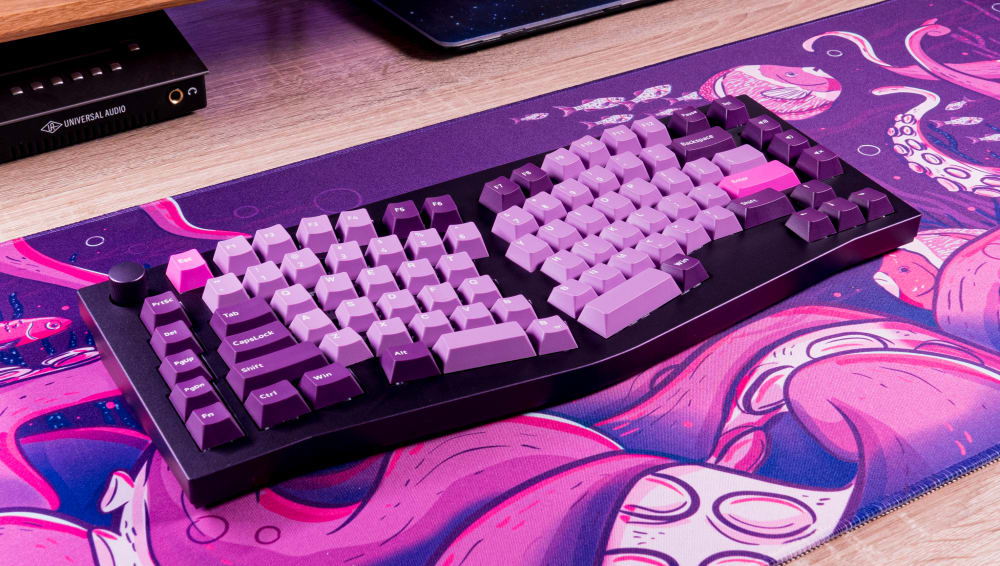

Purple Q10 with Octopus Keycaps on purple desk
Mike is a software engineer who spends most of his day typing away on his computer. He enjoys his job, but he cannot help but feel like something is missing. But this was until he decided to be adventurous and go for a new mechanical keyboard for a change.
At first, Mike was skeptical. He had been using a standard membrane keyboard for years and had never thought twice about it. But as soon as he started typing on the mechanical keyboard, he felt a difference. The keys were more tactile and he could feel the satisfying thock with every keystroke. Suddenly, typing became a joy and he found himself more productive than ever before.
This got Mike thinking, what makes a mechanical keyboard better than a membrane keyboard? Is it just a matter of personal preference or could there be more to it than that? Like Mike, you should care too. and why should you care? Because as someone who spends a significant amount of time typing, the keyboard you use can make all the difference. A good keyboard can help you type faster, reduce fatigue, and enhance your overall typing experience.
In this article, we will explore the key differences between mechanical keyboards and membrane keyboards, so you can easily decide which one is right for you. It does not matter whether you’re a software engineer like Mike, a gamer, a content writer, or just someone who spends a lot of time typing, this article will help you discover the unique features of each keyboard type and why you might want to consider switching to a mechanical keyboard, just like Mike.
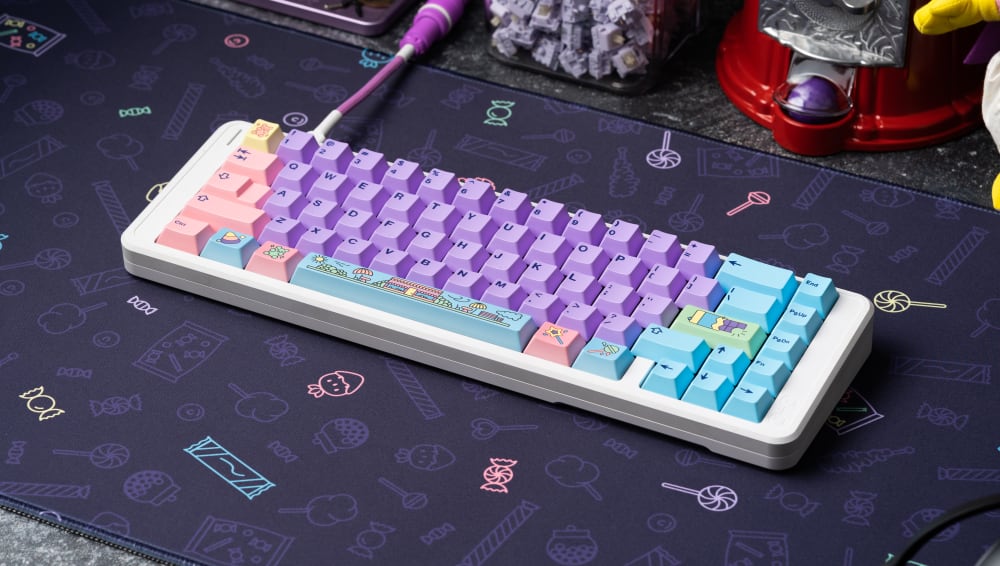

Mechanical Keyboard with Candy Shop Keycaps
What are Mechanical Keyboards?
A mechanical keyboard is a type of keyboard with a tiny mechanical switch underneath each keycap. This spring is responsible for the bouncy and spring-back feeling you get when you use a mechanical keyboard. The switch is activated only after the keyboard has registered the press; and the bounce, bump, or clicking sound informs one of the actuation.
Mechanical keyboards vary so much in design, modification, and technical variation that it is quite hard to define a one-size-fits-all mechanism of how they work. The design of a mechanical keyboard will determine how much force needs to be applied before a press is registered and will also impact how clearly defined the feedback received is.
Features of Mechanical Keyboards
Utilizes a Mechanical Switch: Mechanical keyboards utilize a mechanical switch for ensuring precision and swiftness when typing. There are three types of mechanical keyboard switches which are: clicky, tactile, and linear.
- Clicky Switches: These switches make your keyboard provide a click sound when they hit the actuation point. That way, you know the keypress is registered once you get the clicking sound. An example is the Kailh BOX V2 switch.
- Tactile Switches: These switches inform you that a keypress has been registered with a small-to-medium bump feel on your fingertip during each press. An example would be the Salmon tactile switches.
- Linear Switches: Linear switches do not offer any type of feedback when you press the keycaps, other than when you bottom-out the switch. They may therefore require that you always go all the way down when pressing since you will not receive any feedback to know when the keypress has been registered. A popular option are the Hippo linear switches.
In addition to the switch types above, you can also buy silent switches if you're looking for a keyboard that outputs minimal noise. Linear and tactile switches can be found with silent varieties, but clicky switches are generally not as noise is one of their primary functions.
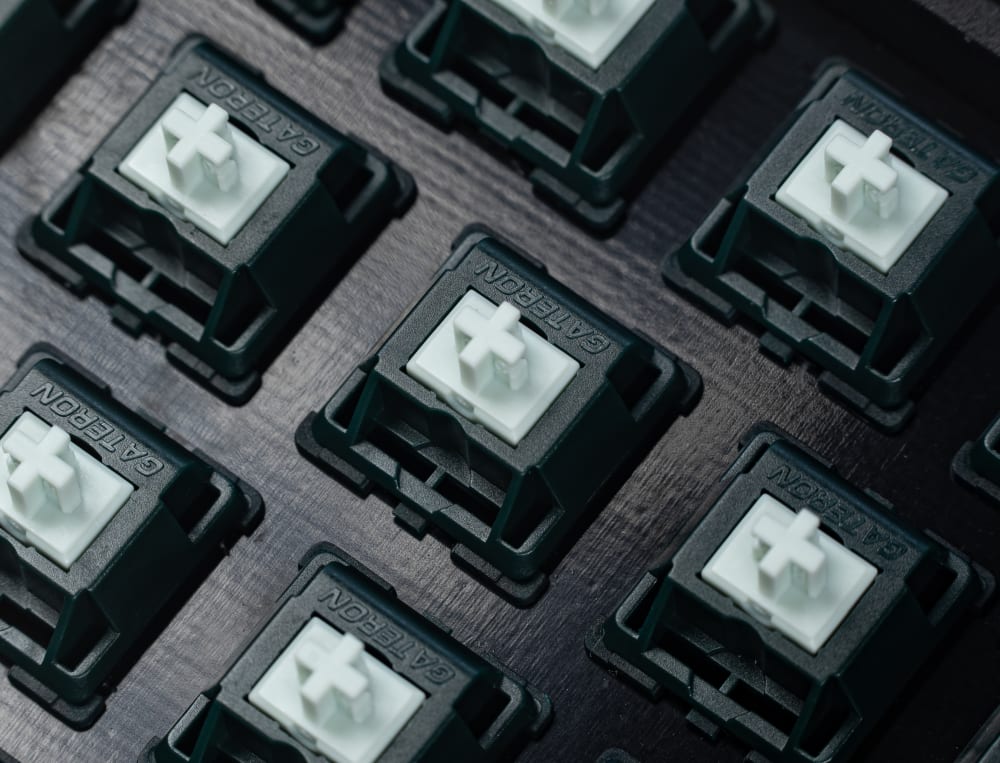

Gecko linear switches
What are Membrane Keyboards?
A membrane keyboard is a type of keyboard that features pressure-sensitive layers underneath its keys. These layers are composed of thin, fragile mesh-like components. When an impact is made on any key, the keycap hits the thin membrane layers, down to the metal end situated at the bottom of the keyboard and registers the appropriate information into the computer.
Membrane keyboards are squishy to the touch and generally do not provide any feedback when you press on them. Working on certain membrane keyboards can give a pillowy to a mushy effect while some are designed to provide a very slight bounce with each press.
Membrane keyboards are very popular and widely used, from the very flat keypads found on devices like microwaves and washing machines to the dome switch membrane keypads used for computer keyboards. The latter is preferred for keyboards because they are slightly raised and will be more convenient for typing than the very flat keypads.
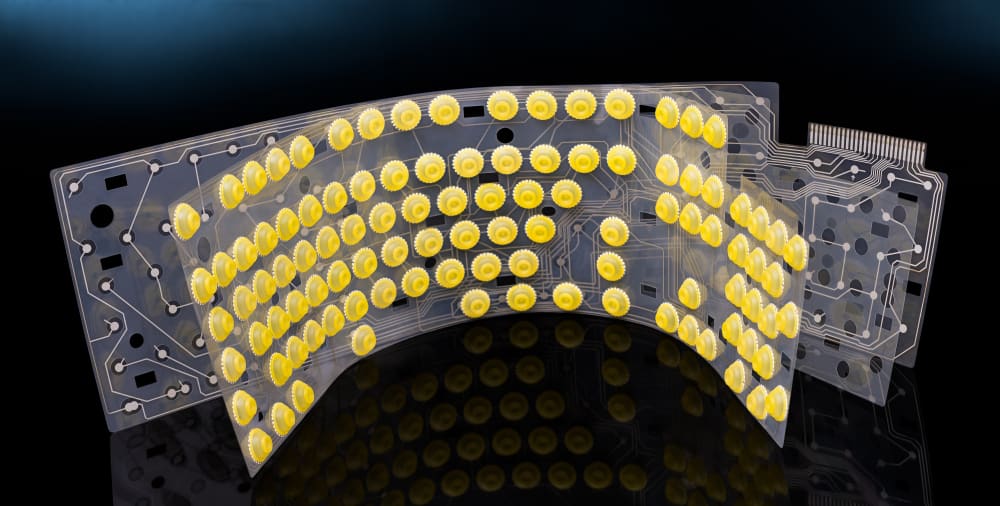

Inside a Membrane Keyboard
Features of Membrane Keyboards
Made of Three Layers of Flexible Materials: The bed of a membrane keyboard is what's called a conductive trace. On the bed lie three very thin and flexible layers. The topmost layer is the membrane layer that your fingertips make contact with.
A Bitter Sweet Rubbery Feel: Thanks to the keycaps made from plastic and the rubber membrane underneath, membrane keyboards tend to have a rubbery feel that borders towards being mushy. This feature is bittersweet because, for some, it is one of the things that makes them fall in love with membrane keyboards, while for others, this feature is just terribly annoying.
Pros and Cons of Mechanical Keyboards
Mechanical Keyboard Pros
Durability and Long Lifespan: Mechanical keyboards are generally very sturdy keyboards that can last for as long as up to 70 to 100+ million keypresses. Thanks to their mechanical spring switches, they are less prone to eating up and flattening out in no time. They are also less prone to keypad issues such as getting stuck or lifting or pulling out of the bed without some strong external force.
Satisfying Feedback: Here’s the one feature most lovers of mechanical keyboards long for in their keyboards. Mechanical keyboards provide satisfying feedback through a clack, a click, or a bumpy feel. This feedback means a lot to certain computer users like gamers and fast typists who rely on them to figure out when a keypress has been registered.
Stability: Thanks to their sturdy and robust build, mechanical keyboards will not slide around as you type aggressively away or manipulate the keypad while furiously gaming.
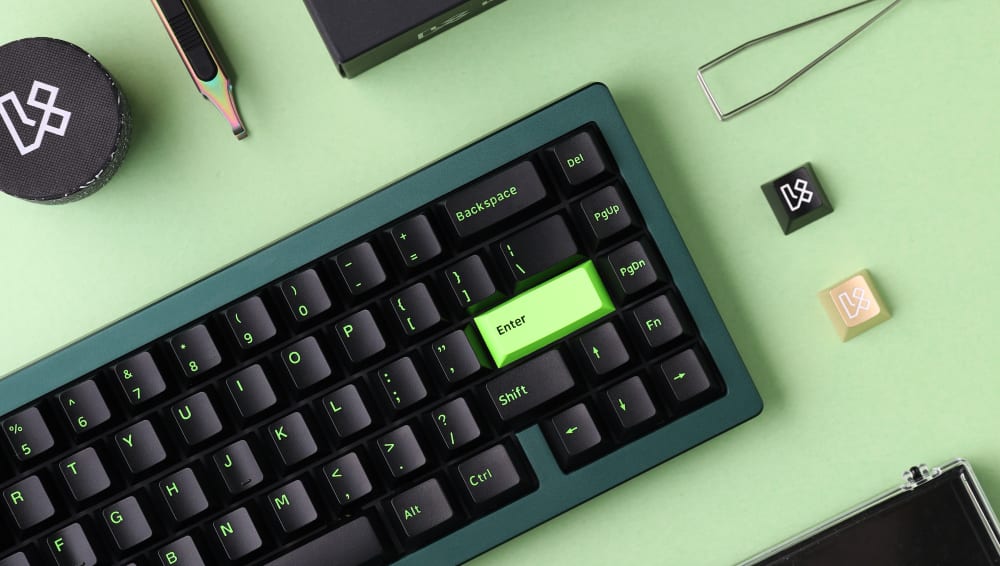

TG67 V2 Mechanical Keyboard
Mechanical Keyboard Cons
They are Expensive: Let's face it, the price of mechanical keyboards tends to be on the high side, especially if you are just an average earner. But considering all of the highly technical features they provide and what materials they are made from, mechanical keyboards are worth all the money spent to purchase them.
They Can be Noisy: If you are looking for a way to annoy the life of your coworkers, purchasing a mechanical keyboard is a good start. It does not matter whether it’s physical or virtual gatherings, the clicking or clacking sound characteristic of most mechanical keyboards is enough to annoy the day out of many or even distract them from their work.
Gamers seem not to mind though since they usually have their auditory senses immersed in their game. Programmers, writers, and other active typists might not mind too, as the continuous clicking sound can be a satisfying feedback that energizes them to continue typing away. If you are a developer, check out this interesting post that explores if mechanical keyboards can make you a better programmer.
But what do you do if you want all the positive features of mechanical keyboards except the noise? You can ditch the mechanical keyboards with linear and clicky switches and go for their more quiet alternatives – the mechanical keyboards with silent linear or silent tactile switches. These keyboard switches aim to achieve the noiseless presses of membrane keyboards while still promising durability and a not-so-mushy experience.
They are Heavier: Compactness and weight can be quite a challenge when dealing with mechanical keyboards since they are usually heavier. This might not sit well with you if you travel around with your keyboard or prefer to keep your keyboard on your lap when working. If your keyboard stays on a fixed surface though, it will not really matter.
Pros and Cons of Membrane Keyboards
Membrane Keyboard Pros
They are Generally Cheaper: Membrane keyboards typically sell for 1/4 to 1/5 the price of mechanical keyboards. This is mostly because the materials used for assembling membrane keyboards are generally cheaper and the components are less manipulative to produce. Also, they tend to be mass produced by huge companies.
Perfect for the Positive Silent Treatment: If you consider the clicking and clacking sounds made by mechanical keyboards quite annoying, or if you are just the type who appreciates the least noise when working, would not like to disturb your whole room of coworkers with the noise from you typing away, or you always have your ears plugged with loud music when working anyway, then a membrane keyboard is ideal for you. The materials used in producing the components of membrane keyboards are mostly rubber and plastic, and these are really noise-dampening. Besides, since the keypads are not as raised as in mechanical keyboards, they have a lower impact with their inner layer and so will generally produce less noise.
Less Stressful to Purchase: If you want a keyboard that you can easily walk to the store and purchase in a matter of minutes, a membrane keyboard offers that. Not that you cannot walk in to pick mechanical keyboards in stores that sell them. However, mechanical keyboards are most times not that readily available, they are rather usually produced based on a buyer’s demand and specific personal preferences. Should you urgently need a keyboard or you want a keyboard you can purchase online without so much thought as to what box it ticks in terms of additional features, a membrane keyboard is likely the best fit.
Compact: Membrane keyboards are easier to move around as they are lightweight and smaller. They are also safe to travel with and can easily be replaced in case of damage or theft.


Dell Membrane Keyboard
Membrane Keyboard Cons
Not as Durable: Most of the components of membrane keyboards are thin plastic and/or rubber sheets. They turn out not as durable as mechanical keyboards and are more susceptible to failures and breakage due to heavy impact. Besides, the thin components, and especially the keycaps can wear out pretty quickly, giving your keyboard a worn-off look in no time.
Least Tolerance for Water Spills: While water spillage on your membrane keyboard does not automatically mean it’s time to pack it up, it can be a very risky adventure. The thin membrane layer might not offer enough protection and can make liquid seep through to the PCB. If that happens, there is a high probability the keyboard would be “gone too soon.”
Shorter Lifespan: Again, this is a pointer to the durability of membrane keyboards. According to HP, membrane keyboards will only last for about 5 million keystrokes. Mechanical keyboards, however, can last for as much as 100 million keystrokes!
Why a Mechanical Keyboard is a Great Option for You
Best Precision: Whether you are a gamer, a programmer, or a writer. Everyone who is an active user of their keypad loves a very precise and swift keyboard. Mechanical keyboards are the most reliable keyboards for achieving this swiftness and precision. While membrane keyboards can also be precise, there is a high chance that the thin inner layers will begin to wear out in no time. Unfortunately, this wear won’t be even. The keys you use most often will begin to wear out first. This will result in an inconsistency of very flat and slightly raised keys, impacting precision and speed when carrying out functions.
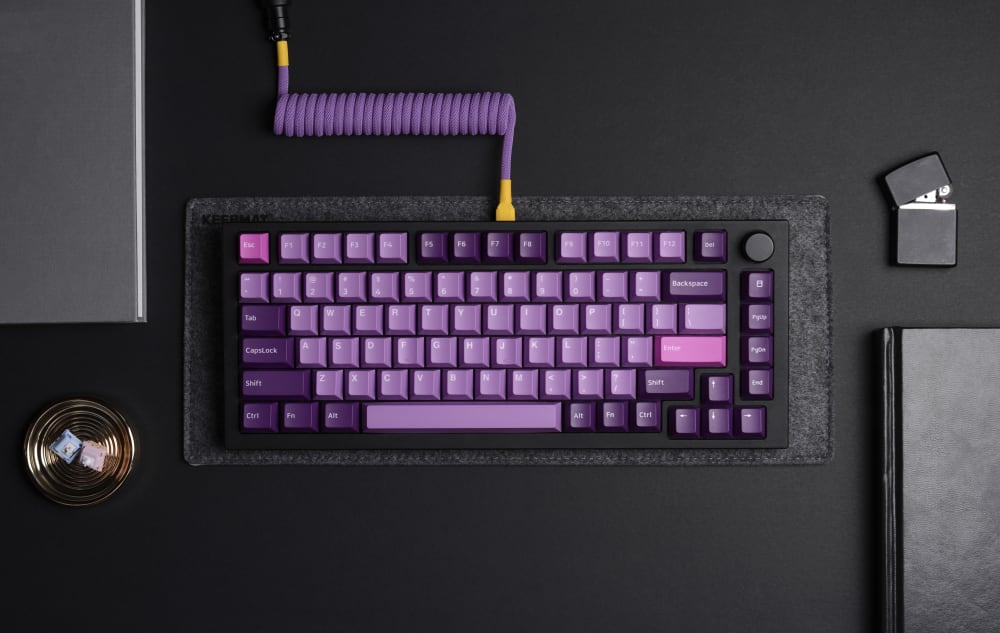

PolyCaps Octopus on Mechanical Keyboard
When gaming, precision will surely impact your flow. The state of your keyboard is therefore something you should pay attention to. The same applies to writers and programmers, as inconsistencies can result in typing errors like omissions and slow feedback for some keys, causing frequently occurring typographical errors.
Mechanical keyboards will also register a keypress at the slightest touch, unlike membrane keyboards that require you to go all the way down for the layers to impact the metal that triggers the circuit. Besides, there is an ever-present feedback with mechanical keyboards that let you know when a press has actually been registered.
Allows for Key Rollover: When you press down several keys at once on your mechanical keyboard, all the keys pressed will be detected and with a swift response at that. This feature is absent in membrane keyboards and can cause omissions when typing way too fast.
Can be Customized to Suit Your Taste: Here is one feature that has made mechanical keyboards highly appealing to many computer users. While it is well known that mechanical keyboards provide an immersive and exciting feel to whatever you're doing, what makes them even more exciting to use is the fact that you can customize even the tiniest bit of details about your keyboard.
Whether it is specifications like the color and shape, or more technical details like the production material, switch type, keycap height, and general programming, you can customize your mechanical keyboard to just about anything you can think of. You can also replace keycaps for a change or so you can incorporate a new feature.
Moreover, mechanical keyboards allow for several modifications, such as adding stabilizers that can help to tune in the sound of your keyboard to your preference, dampen the sound altogether, or even get ergonomic switches and keycaps that provide you with uniqueness and ease. In summary, with mechanical keyboards, your experience when on your computer can never be boring!
Parts Can Easily be Replaced: Could it be just the switch of your mechanical keyboard or a missing keycap you are interested in replacing? You could easily do that and you could replace almost every other component of your mechanical keyboard. This is a feature that is not common, if not impossible with most membrane keyboards. If one of the components is damaged or not satisfactory enough, you may have to buy a whole new keyboard since you will not be able to replace that component.
That said, a mechanical keyboard is great for you if you are building a collection of different components, like to explore different types of feedback per time, or if you just easily get bored with having the same feature on your keyboard for too long.
Opportunity to Build and Experiment: Mechanical keyboards offer you the opportunity to become your own technician and build your own customized keyboard from the scratch using components you picked for yourself. If you love to toy with computers and your “techy side” is something you pride in, then a mechanical keyboard is a sure one to add to your collection! Just one keyboard is enough for a start, and then you can begin to purchase components and watch yourself build different keyboard variations to suit different tastes.
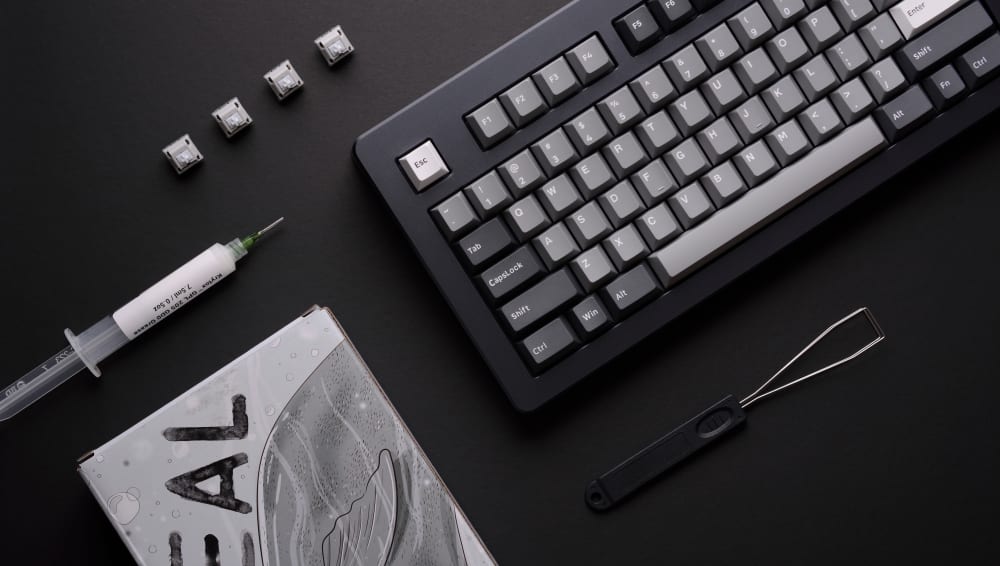

PolyCaps Seal V2 on Mechanical Keyboard
Conclusion
The world never stops presenting us with choices, living us on a constant quest to always make the best picks. When it comes to choosing the right keyboard, we all could make do with a comprehensive review of what to expect and what not to expect with the keyboard types available out there.
While you may choose to try your hands on different types of keyboards until you find the perfect one for you, we believe that this review is a comprehensive guide that can help you decide what you should get based on your preferences.
A mechanical keyboard might be techy and immersive and a membrane keyboard might be silent and soothing. What matters though is that you enjoy the experience with whatever keyboard you choose to go for!
Frequently Asked Questions
Below are some of the most frequently asked questions regarding membrane vs. mechanical keyboards:
- Is mechanical keyboard or membrane better for gaming?
- Professional E-Sport gamers prefer mechanical keyboards for several reasons: customizable actuation distance, custom feel, custom sound, n-key rollover, anti-ghosting, and programmable keys. Mechanical keyboards are also more durable in general and can give a slight edge for competitive gaming.
- Why do people prefer mechanical keyboards over membrane?
- In summary, most people prefer mechanical keyboards over membrane ones because they are: heavier, more durable, more customizable, and higher quality.
- Is membrane or mechanical keyboard better for fast typing?
- Generally speaking, mechanical keyboards are better for fast typing as they are built with higher quality materials, and you can customize the actuation distance with a speed switch, meaning typing will require less distance and less force. Furthermore, mechanical keyboards have n-key rollover, anti-ghosting, and programmable keys.
- Does membrane keyboard feel better than mechanical?
- In most cases, membrane keyboards do not feel better than mechanical keyboards as membrane keyboards are often described as being 'mushy.' Mechanical keyboards can be customized to feel and sound how you'd want them to.
- How long do membrane keys last?
- A membrane keyboard's durability is related to its price. For cheap keyboards, you can expect to replace them every 1-2 years. For higher end keyboards, they can last 5+ years. Unlike membrane keyboards, mechanical keyboards generally have replaceable PCBs if they ever break.
- Are membrane keyboards bad for typing?
- Membrane keyboards are not necessarily bad for typing, but they do not offer the same level of customizability when compared to mechanical keyboards.
- What are the disadvantages of membrane keyboard?
- In summary, the disadvantages of membrane keyboards are: low durability, lack of customizability, lack of features, and lower quality materials when compared to mechanical keyboards.
- What are the pros and cons of membrane keyboard?
- The biggest pro of a membrane keyboard is low cost, especially when compared to high-end mechanical keyboards, which can cost you hundreds of dollars.
- What are the disadvantages of a mechanical keyboard?
- The biggest downside of mechanical keyboards are their cost: due to their high quality materials and limits in supply chain, they tend to cost significantly more than membrane keyboards.
- Is it worth switching to mechanical keyboard?
- Yes, mechanical keyboards are worth switching to as they provide more customizability, more features (n-key rollover, anti-ghosting, programmable keys), higher durability, and higher quality materials.
- Do mechanical keyboards ever break?
- Mechanical keyboards generally don't break from day-to-day use, but if you regularly spill liquids on the mechanical keyboard or drop it from a high distance, you may need to replace the PCB.